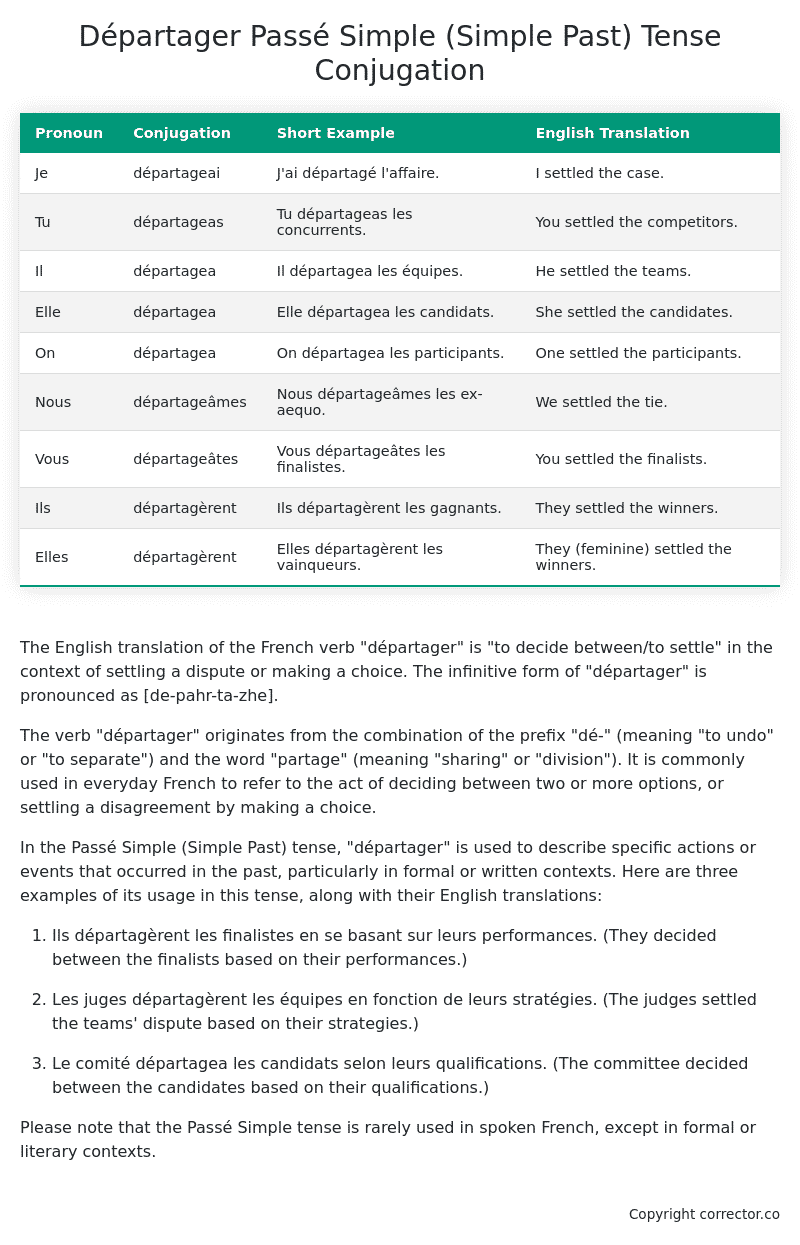Passé Simple (Simple Past) Tense Conjugation of the French Verb départager
Introduction to the verb départager
The English translation of the French verb “départager” is “to decide between/to settle” in the context of settling a dispute or making a choice. The infinitive form of “départager” is pronounced as [de-pahr-ta-zhe].
The verb “départager” originates from the combination of the prefix “dé-” (meaning “to undo” or “to separate”) and the word “partage” (meaning “sharing” or “division”). It is commonly used in everyday French to refer to the act of deciding between two or more options, or settling a disagreement by making a choice.
In the Passé Simple (Simple Past) tense, “départager” is used to describe specific actions or events that occurred in the past, particularly in formal or written contexts. Here are three examples of its usage in this tense, along with their English translations:
-
Ils départagèrent les finalistes en se basant sur leurs performances.
(They decided between the finalists based on their performances.) -
Les juges départagèrent les équipes en fonction de leurs stratégies.
(The judges settled the teams’ dispute based on their strategies.) -
Le comité départagea les candidats selon leurs qualifications.
(The committee decided between the candidates based on their qualifications.)
Please note that the Passé Simple tense is rarely used in spoken French, except in formal or literary contexts.
Table of the Passé Simple (Simple Past) Tense Conjugation of départager
| Pronoun | Conjugation | Short Example | English Translation |
|---|---|---|---|
| Je | départageai | J’ai départagé l’affaire. | I settled the case. |
| Tu | départageas | Tu départageas les concurrents. | You settled the competitors. |
| Il | départagea | Il départagea les équipes. | He settled the teams. |
| Elle | départagea | Elle départagea les candidats. | She settled the candidates. |
| On | départagea | On départagea les participants. | One settled the participants. |
| Nous | départageâmes | Nous départageâmes les ex-aequo. | We settled the tie. |
| Vous | départageâtes | Vous départageâtes les finalistes. | You settled the finalists. |
| Ils | départagèrent | Ils départagèrent les gagnants. | They settled the winners. |
| Elles | départagèrent | Elles départagèrent les vainqueurs. | They (feminine) settled the winners. |
Other Conjugations for Départager.
Le Present (Present Tense) Conjugation of the French Verb départager
Imparfait (Imperfect) Tense Conjugation of the French Verb départager
Passé Simple (Simple Past) Tense Conjugation of the French Verb départager (You’re reading it right now!)
Passé Composé (Present Perfect) Tense Conjugation of the French Verb départager
Futur Simple (Simple Future) Tense Conjugation of the French Verb départager
Futur Proche (Near Future) Tense Conjugation of the French Verb départager
Plus-que-parfait (Pluperfect) Tense Conjugation of the French Verb départager
Passé Antérieur (Past Anterior) Tense Conjugation of the French Verb départager
Futur Antérieur (Future Anterior) Tense Conjugation of the French Verb départager
Subjonctif Présent (Subjunctive Present) Tense Conjugation of the French Verb départager
Subjonctif Passé (Subjunctive Past) Tense Conjugation of the French Verb départager
Subjonctif Imparfait (Subjunctive Imperfect) Tense Conjugation of the French Verb départager
Subjonctif Plus-que-parfait (Subjunctive Pluperfect) Tense Conjugation of the French Verb départager
Conditionnel Présent (Conditional Present) Tense Conjugation of the French Verb départager
Conditionnel Passé (Conditional Past) Tense Conjugation of the French Verb départager
Conditionnel Passé II (Conditional Past II) Tense Conjugation of the French Verb départager
L’impératif Présent (Imperative Present) Tense Conjugation of the French Verb départager
L’impératif Passé (Imperative Past) Tense Conjugation of the French Verb départager
L’infinitif Présent (Infinitive Present) Tense Conjugation of the French Verb départager
L’infinitif Passé (Infinitive Past) Tense Conjugation of the French Verb départager
Le Participe Présent (Present Participle) Tense Conjugation of the French Verb départager
Le Participe Passé (Past Participle) Tense Conjugation of the French Verb départager
Struggling with French verbs or the language in general? Why not use our free French Grammar Checker – no registration required!
Get a FREE Download Study Sheet of this Conjugation 🔥
Simply right click the image below, click “save image” and get your free reference for the départager Passé Simple tense conjugation!

Départager – About the French Passé Simple (Simple Past) Tense
Formation
Usage
Narration
Historical Context
Interactions with other tenses
Passé Composé
Imparfait
Conditional and Subjunctive
Summary
I hope you enjoyed this article on the verb départager. Still in a learning mood? Check out another TOTALLY random French verb conjugation!


